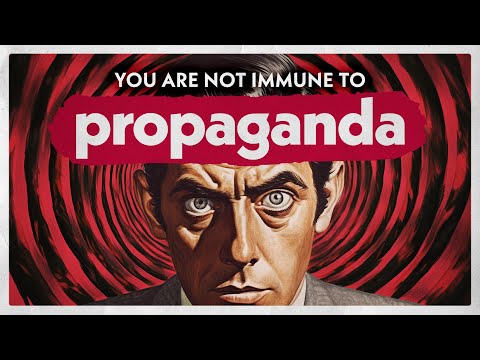By Caitlin JOHNSTONE
When most people in the English-speaking world hear the word « propaganda », they tend to think of something that's done by foreign nations who have governments that are so totalitarian they won't even let people know what's true or think for themselves.
Others understand that propaganda is something that happens in their own nation, but think it only happens to other people in other political parties. If they think of themselves as left-leaning they see those to their right as propagandized by right wing media, and if they think of themselves as right-leaning they see those to their left as propagandized by left wing media.
A few understand that propaganda is administered in their own nation by their own media, and understand that it's administered across partisan lines, but they think of it in terms of really egregious lies like weapons of mass destruction in Iraq or babies being taken from incubators in Kuwait.
In reality, all are inaccurate understandings of what propaganda is and how it works in western society. Propaganda is administered in western nations, by western nations, across the political spectrum - and the really blatant and well-known examples of its existence make up only a small sliver of the propaganda that our civilization is continuously marinating in.
The most common articles of propaganda - and by far the most consequential - are not the glaring, memorable instances that live in infamy among the critically minded. They're the mundane messages, distortions and lies-by-omission that people are fed day in and day out to normalize the status quo and lay the foundation for more propaganda to be administered in the future.
One of the forms this takes is the way the western political/media class manipulates the Overton window of acceptable political opinion.
Have you ever noticed how when you look at any mainstream newspaper, broadcast or news website, you never see views from those who oppose the existence of the US-centralized empire? Or those who want to close all foreign US military bases? Or those who want to dismantle capitalism? Or those who want a thorough rollback of the creeping authoritarianism our civilization is being subjected to? You might see some quibbling about different aspects of the empire, some debate over whether we should de-escalate against Russia so we can better escalate against China, but you won't ever see anyone calling for the complete end of the empire and its abuses altogether.
That's propaganda. It's propaganda in multiple ways: it excludes voices that are critical of the established status quo from being heard and influencing people, it amplifies voices (many of whom have packing foam for brains) which support the status quo, and, most importantly, it creates the illusion that the range of political opinions presented are the only reasonable political opinions to have.
The creation of that illusion is propaganda. It's not something solid that you can point to easily because it's comprised of an omission of something rather than a concrete thing, but it warps people's perspectives in ways that have immensely far-reaching consequences. It's something that doesn't stand out too sharply against the background, but because people are exposed to it continuously day in and day out, it plays a huge role in shaping their worldview.
Another related method of manipulation is agenda-setting - the way the press shapes public thinking by emphasising some subjects and not others. In placing importance on some matters over others simply by giving disproportionate coverage to them, the mass media (who are propagandists first and news reporters second) give the false impression that those topics are more important and the de-emphasised subjects are less so. As political scientist Bernard Cohen famously observed way back in 1963, the press « may not be successful much of the time in telling people what to think, but it is stunningly successful in telling its readers what to think about. The world will look different to different people depending on the map that is drawn for them by writers, editors, and publishers of the paper they read. »
Ever noticed how the fact that our governments are i ncreasingly tempting nuclear war seems like it ought to be a front-page story pretty much every day of the week, but instead the news is full of stuff like the US presidential race and people arguing over what products Target should sell during Pride Month? That's agenda-setting.
The press could easily have spent the entire Trump administration screaming about the dangerous aggressions Trump was advancing against Russia instead of calling him a Putin puppet, and mainstream liberals would have fixated on Trump's warmongering insanity instead of calling him Putin's cock holster. But that wouldn't have served the interests of the empire, which had been planning to ramp up aggressions against Russia for years. They set the agenda, and the public fell in line.
Another of the mundane, almost-invisible ways the public is propagandized from day to day is described in a recent video by Second Thought titled « You're Not Immune To Propaganda ». We're continually fed messages by the capitalist machine that we must work hard for employers and accept whatever standards and compensation they see fit to offer, and if we have difficulty thriving in this unjust system the fault lies with us and not with the system. Poor? That's your fault. Miserable? Your fault. Unemployed? Your fault. Overworked? Your fault.
The continual message we're fed every day is that there's nothing to rebel against and nothing to oppose, because any problems we're perceiving are our own fault and not the fault of an abusive, exploitative system which is built to extract profit from the working class and the ecosystem at the expense of both. The system cannot be a failure, it can only be failed.
Then there's the ideological herding funnel we discussed recently, which herds the population into two mainstream factions of equal size which both prevent all meaningful change and serve the interests of the powerful. Anyone who can't be herded into either of these mainstream factions is instead herded into fake « populist » factions, which eventually corral them back into the mainstream factions. Those few politically engaged people who can't be herded toward any of these groups are so small in number that they can simply be marginalized and denied any sizeable platform from which to spread their ideas, and « democracy » does the rest because the majority are supporting the status quo.
Maybe the most consequential of all the mundane, routine ways we're propagandized is the way the mass media manufacture the illusion of normality in a dystopia so disturbing that we would all scream our lungs out if we could see it with fresh eyes. The way pundits, politicians and reporters will talk about the Biden administration surrounding China with war machinery without also talking about how freakish and horrifying it is that we're looking at rapidly escalating brinkmanship between nuclear-armed countries. The way American cities are full of homeless people and it's just treated as a normal and acceptable thing to simply let them stay homeless and push them out of wherever they try to be. The way nothing ever changes no matter who we vote for but we're still herded into the voting booths and told to vote better.
As a character in the movie Waking Life puts it , « We all know the function of the media has never been to eliminate the evils of the world, no! Their job is to persuade us to accept those evils and get used to living with them. The powers that be want us to be passive observers. And they haven't given us any other options outside the occasional purely symbolic act of voting - do you want the puppet on the right or the puppet on the left? »
They don't just tell us what to believe about the world, they tell us what to believe about ourselves. They give us the frameworks upon which we cast our ambitions and evaluate our success, and we build psychological identities out of those constructs. I am a businessman. I am unemployed. My life is about making money. My life is about disappointing people. I am a success. I am a failure. They invent the test of our adequacy, and they invent the system by which we are graded on that test.
Over and over and over again, day after day, we are fed seemingly small messages which add up over time. Messages like,
- The world works more or less the way we were taught in school.
- The media have some problems but basically tell the truth.
- The status quo is working basically fine.
- Democracy is real and voting is effective.
- This is the only way things can be.
- Our government might have its problems, but it's basically good.
- You can earn your way into happiness by working harder.
- You can consume your way into happiness with more spending.
- If you think the system is dysfunctional, you're the dysfunctional one.
- Those who oppose the status quo are weird and untrustworthy.
- Things might get better after the next election cycle.
- Any attempt to change things is a silly waste of time.
By feeding us all these simple, foundational lies day after day, year after year from the time we are very young, they lay the groundwork for the more complex, specific lies we'll be told later on. Lies like « Russia/China/Iran/etc is a real problem and its government needs to be stopped, » or « People are struggling financially right now, but it's just because times are hard and it can't be helped. »
All the mundane lies serve as a primer for the lies we'll be told later, because once our worldview has been shaped by them, our basic human cognitive biases and predisposition to reject information which conflicts with our worldview will ensure that we'll take on board the information which confirms our biases and reject any evidence against it. They construct our worldviews for us, then let our normal cognitive defense systems protect it.
Their messages don't even need to be well-evidenced or well-argued, they only need to be repeated frequently due to a glitch in human cognition known as the illusory truth effect which causes us to mistake the feeling of having heard something before with the feeling of something being true.
Add to all this the recent development of things like Silicon Valley algorithm manipulation and the deck becomes stacked against truth even further, because someone's odds of stumbling across information which conflicts with the propaganda they've been fed goes dramatically down. Even if they're actively searching for information which conflicts the mainstream worldview, algorithms by Google and Google-owned YouTube often make it almost impossible to find.
So that's what we're up against. There's a failure to appreciate just how pervasive and powerful the empire's propaganda machine is, even among those who are very critical of empire, because propaganda in our society is like water for fish - we're swimming in it constantly, so we don't see it. You have to step way, way back and begin examining our situation from its most basic foundations to get any perspective on how all-encompassing it really is.
Finding your way out of the propaganda matrix takes a lot of diligent work, tons of curiosity, the humility to admit you've been completely wrong about everything, and more than a little plain dumb luck. But if you keep hacking away at it eventually you get there, and then you can help others get there too. It's a hard slog, but if our chains are psychological that means they're ultimately only made of dream stuff. All that needs to happen is for enough of us to wake up.



